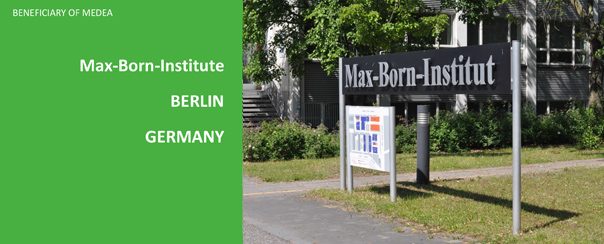Home institution
The Max Born Institute for Nonlinear Optics and Short Pulse Spectroscopy (MBI) is a non-profit research institution, organized in the legal form of a registered association (Forschungsverbund Berlin e.V.). The MBI is scientifically independent but without legal personality. It is at the same time member of the Leibniz Gemeinschaft and is funded (50% each) by the German federal government (BMBF) and the German states (Länder), in particularly by Berlin. MBI is located at Berlin-Adlershof, City for Science, Technology and Media, one of Germany’s major technology parks and a focal point for science, innovative enterprises and media in the region of the German capital. It is positioned in the South-East of Berlin.
The MBI maintains close scientific relations with the three Berlin universities. Its directors are jointly appointed by the institute and one of the universities. Marc Vrakking is full professor at FU-Berlin, Stefan Eisebitt at TU-Berlin and Thomas Elsässer at HU zu Berlin.
The institute was founded by the end of 1991 and consists presently of about 180 members of staff, among them 90 scientists (including guest scientists and PhD students).
The MBI conducts basic research in the field of nonlinear optics and ultrafast dynamics of the interaction of light with matter and pursues applications that emerge from this research. It develops and uses ultrafast and ultra-intense lasers and laser-driven short-pulse light sources in a broad spectral range in combination with methods of nonlinear spectroscopy.
MBI’s research program focuses on new sources for ultra-short and ultra-intense light pulses, pulse shaping, pulse characterization, measuring techniques for ultra-fast processes in a broad spectral range from the mid-infrared to the x-ray region, ultrafast and nonlinear phenomena with special emphasis on atoms, molecules, clusters and plasmas and surfaces and solid state.
With its research the MBI fulfills a nationwide mission and is an integral part of the international science community. The MBI is involved in a large number and variety of cooperative research projects with universities, other research institutions and industrial partners.
The research structure of the Max Born Institute comprises 10 research projects and two infrastructure projects, organized in 4 focus areas. Complementary to this, the organizational structure with 3 research divisions (each with 3 departments) defines the key fields of scientific competence of MBI-scientists and the corresponding scientific equipment.
The combination of modern laser development and measuring technique with its interdisciplinary application in basic research and for emerging key technologies constitutes the unique profile of the MBI and its attraction to external cooperation partners.
Research Training Modules (RTMs)
- Inversion procedure for angular resolved photoelectron measurements(see PDF below for details)
- Introduction to strong field ionization of atoms and molecules (see PDF below for details)
Address
Max-Born-Institut
Max-Born-Straße 2 A
12489 Berlin, Germany
General Contacts
http://www.mbi-berlin.de
mbi@mbi-berlin.de
Scientist in charge
Olga Smirnova
+49.30.6392.1340
smirnova@mbi-berlin.de
Contact Person
Catrin Damm
+49.30.6392.1201
damm@mbi-berlin.de
